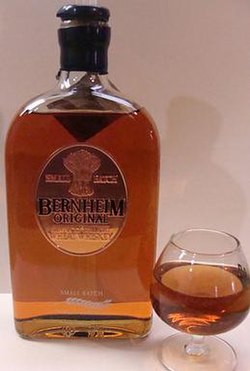This article needs additional citations for verification .(November 2025) |
 | |
| Type | Wheat whiskey |
|---|---|
| Manufacturer | Heaven Hill |
| Origin | Kentucky, United States |
| Alcohol by volume | 45.00% |
| Proof (US) | 90 |
| Related products | Heaven Hill |
Bernheim Original is a wheat whiskey produced in Bardstown, Kentucky by Heaven Hill Distilleries. It is sold in glass in 16 oz pint bottles, glass 750ml bottles, glass 1-liter bottles. A relatively inexpensive whiskey, it compares to the rarer and more expensive Pappy Van Winkle. [1]